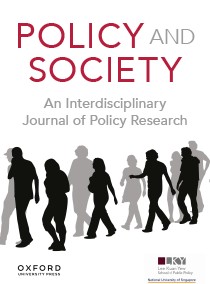Critical policy capacity factors in the implementation of the community health worker program in India
IF 6.1
1区 社会学
Q1 POLITICAL SCIENCE
引用次数: 1
Abstract
This paper employs the policy capacity framework to develop a multidimensional and nested policy analysis that is able to examine how different types of capacity—analytical, organizational, and political from different related levels of the health system—have contributed to both policy success and failure during the implementation of a politically significant national community health worker (CHW) program in India. Directed toward rural and urban marginalized populations in India, this CHW has become the world’s largest CHW program. Launched in 2006, it has targeted communitization, strengthening of the primary health-care system, and universal health-care coverage, ultimately receiving an international award in 2022. We argue that, in a context of capacity deficits and tensions between different capacity domains, the individual political capacity has been more critical to policy success and strengthening. The analysis not only clarifies the ways in which the government took some initiatives to build up capacity but also highlights capacity deficits along different competency dimensions. This approach demonstrates the value of understanding and creating awareness concerning complex poor-resource settings and low organizational capacity while concomitantly building up the capacities needed to foster (workforce and leadership) strengthening.关键的政策能力因素在印度社区卫生工作者方案的实施
本文采用政策能力框架来开发一个多维和嵌套的政策分析,能够检查来自卫生系统不同相关层面的不同类型的能力-分析,组织和政治-如何在印度实施具有政治意义的国家社区卫生工作者(CHW)计划期间促成政策的成功和失败。针对印度农村和城市边缘人口,这个CHW项目已经成为世界上最大的CHW项目。该奖项于2006年启动,目标是实现社会化、加强初级卫生保健系统和全民卫生保健覆盖,最终于2022年获得一项国际奖项。我们认为,在不同能力域之间的能力赤字和紧张的背景下,个人政治能力对政策的成功和加强更为关键。分析不仅阐明了政府在能力建设方面采取的一些措施,而且突出了不同能力维度的能力不足。这种方法显示了了解和提高对复杂的资源匮乏环境和低组织能力的认识,同时建立促进(劳动力和领导)加强所需的能力的价值。
本文章由计算机程序翻译,如有差异,请以英文原文为准。
求助全文
约1分钟内获得全文
求助全文
来源期刊

Policy and Society
Multiple-
CiteScore
18.00
自引率
6.50%
发文量
43
审稿时长
30 weeks
期刊介绍:
Policy and Society is a prominent international open-access journal publishing peer-reviewed research on critical issues in policy theory and practice across local, national, and international levels. The journal seeks to comprehend the origin, functioning, and implications of policies within broader political, social, and economic contexts. It publishes themed issues regularly and, starting in 2023, will also feature non-themed individual submissions.
 求助内容:
求助内容: 应助结果提醒方式:
应助结果提醒方式:


